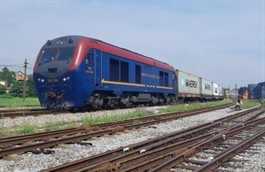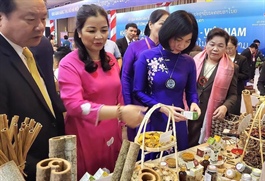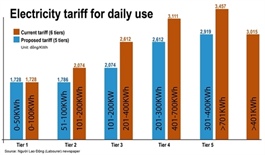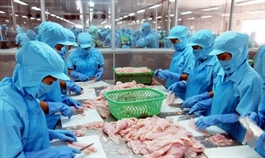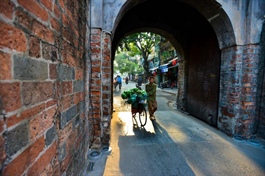Hanoi to expand model of agricultural and rural tourism
Hanoi to expand model of agricultural and rural tourism
Many localities in Hanoi have not seen the potential of agricultural and rural tourism, of which a large number of tourist spots not cooperating with each other and developing spontaneously.
Leaders of the Hanoi tourism department will propose to the municipal authorities to expand more models of agricultural and rural tourism in many localities to develop this type of tourism in a more systematic and professional manner.
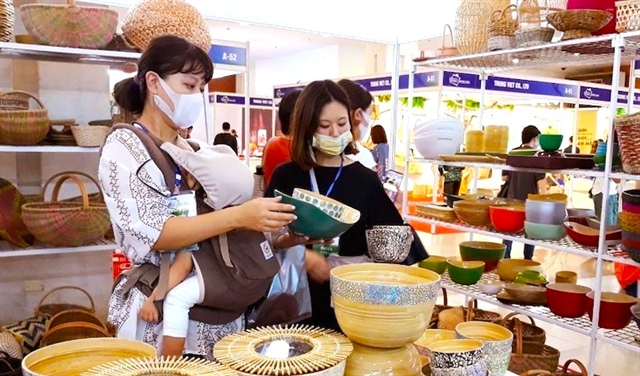
Foreign tourists are interested in Hanoi's craft villages. Photo: The Hanoi Times |
Director of the Hanoi Department of Tourism Dang Huong Giang gave her statement at a scientific workshop on the development of agricultural and rural tourism in Hanoi on July 11, adding that this workshop aims to identify and evaluate the potential and solutions for the type of tourism in Hanoi in a comprehensive way. The potential is high, but there are limitations.
The city has issued and implemented a plan to develop agricultural and rural tourism linked with building new rural areas in Hanoi in the 2022-2025 period, to introduce visitors to local specialized products, according to the Hanoi Department of Tourism director.
Many departments and localities have conducted many programs and activities combining the development of agro-rural tourism and new rural areas. Notably, the city has two villages whose products rated by the One Commune One Product program in the groups of community-based tourism, eco-tourism and tourist spots, including the Hong Van ornamental creature village (in Hong Van Commune, Thuong Tin District) and the Phu Dong Green Park ecological zone (in Phu Dong Commune, Gia Lam District).
The city has recognized seven tourist spots in suburban areas linked with agro-rural tourism, handicraft villages, and eco-tourism, including the Duong Xa relic site and the Phu Dong Green Park in Gia Lam District, Thuy Ung horn carving village and Van Diem wood carving village in Thuong Tin District, Dai Ang and Yen My tourist spots in Thanh Tri District, and Long Ho tourist spot in Kim Son Commune, Son Tay Town.
Nguyen Thi Phuong from the Vietnam Association of Agricultural Economics and Rural Development said agro-rural tourism in Hanoi still faces many difficulties and limitations. Many localities have not seen the potential of this type of tourism. Many models are still self-developed and do not cooperate with others. In addition, land management policies for agriculture and rural areas are still inadequate.
- Impactful measures
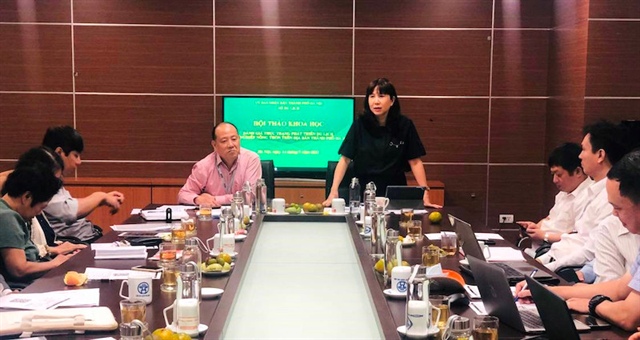
Delegates attend the conference. Photo: Hanoimoi newspaper |
Agro-rural tourism is considered a key product that can become the spearhead, creating specialized products to attract tourists to stay longer and experience in the capital city, participating delegates said, and suggesting solutions to develop agro-rural tourism more systematically and professionally.
Le Khac Nhu, Head of the Ba Vi District Culture and Information Department, who is oriented to vigorously developing agro-rural tourism, suggested reviewing households and facilities owning large specialized areas and products that have been recognized as OCOP or collective trademarks to encourage them to participate and meet the criteria for recognizing agritourism products.
Nguyen Van Phuong, Vice Chairman of the People's Committee of Hong Van Commune (Thuong Tin District), said that it should be a policy on rural human resources, focusing on career conversion for young people in localities to join the locality’s economic activities, and ensuring security and safety for tourists.
Ngo Kieu Oanh, Founder and operator of Ba Vi Homestead, one of the successful models in developing agro-rural tourism in Hanoi, believed that it is important to develop tourism linked to the natural resource and handicraft villages to attract the participation of local communities.
From the perspective of travel businesses, Ta Huu Chien, Director of Sunvina Travel Company, proposed a connection between the tourism and education sectors to promote educational tourism experiences in rural areas, creating stability regarding the number of visitors for agro-rural tourism spots.
|
According to a plan of the City People's Committee on developing agricultural and rural tourism associated with new rural construction in Hanoi in the 2022-2025 period, each district or town should aim to have at least one to three community tourism services and tourist attractions and have at least 50% of these products protected by intellectual property law and recognized by the One Commune One Product program (OCOP) with three stars or higher standards. They should have at least one model of a typical agricultural and rural tourism chain with the participation of farmers, cooperatives, business households and enterprises. |








